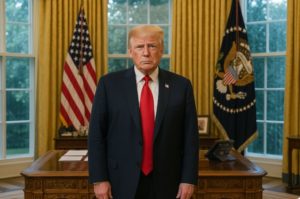WASHINGTON – President Donald Trump has urged the European Union to impose tariffs of up to 100% on imports from China and India—major buyers of Russian oil—in an effort to squeeze Moscow financially and force President Vladimir Putin to negotiate an end to the war in Ukraine.
The proposal comes amid intensifying U.S. frustration at Russia’s unrelenting missile and drone attacks on Ukraine, and growing concern that existing sanctions are not sufficient to deter Kremlin aggression.
EU’s Caution and Likely Response
Officials in Brussels have reacted with skepticism. While acknowledging U.S. pressure to amplify economic measures against Russia, EU sources say the bloc is unlikely to adopt sweeping tariffs on China or India. Legal, trade, and geopolitical complications are cited:
- Tariffs are not the same as sanctions; imposing them involves lengthy investigations, especially under World Trade Organization rules.
- The EU remains sensitive to the risk of retaliation from Beijing or New Delhi, which could hurt European exporters.
- Internal divisions—among member states concerned about energy, trade dependencies, and economic fallout—may block consensus.
As of the latest reports, no decision has been made to impose these tariffs. Alternate routes—such as tightening sanctions on specific companies, banks, or energy producers tied to Russia—are viewed as more feasible by Brussels.
Diplomatic Moves and Trade Relations
Trump has signaled that he plans to speak with Indian Prime Minister Narendra Modi in the coming weeks, expressing optimism about concluding ongoing trade negotiations with India. Modi reciprocated, describing the U.S.–India relationship as one of “natural partners” and expressing hope for an early agreement.
On the Chinese side, the proposal would mark a departure from the EU’s current strategy, which has largely involved sanctions, diplomatic pressure, and reducing dependency on Russian energy—but has stopped short of broad-based tariff imposition.
Implications and Challenges
Analysts warn that such tariffs, if implemented, could disrupt global trade, raise costs for consumers, and increase international tensions. Key points include:
- Retaliatory measures from China or India could escalate trade conflicts.
- European businesses heavily reliant on imports from China or India may suffer.
- WTO compliance and legal challenges could delay or limit the scope of any tariffs.
Meanwhile, the war in Ukraine shows signs of escalating violence: recent large-scale drone and missile attacks have struck symbolic and government targets, particularly in Kyiv. Civilian casualties continue, including a deadly attack in the eastern Donbas region. (zai)

